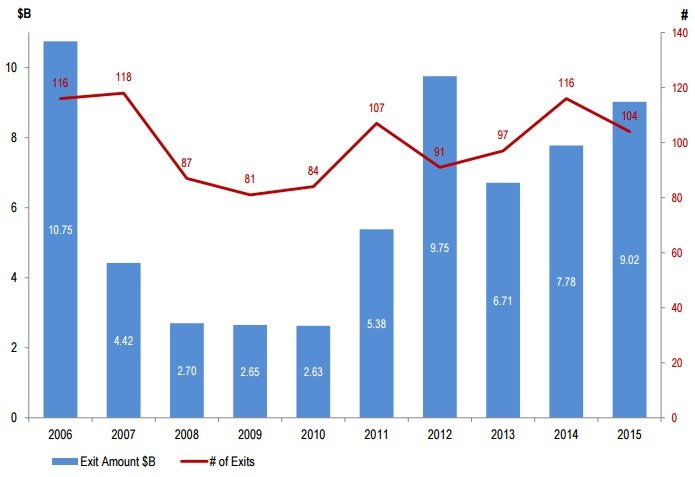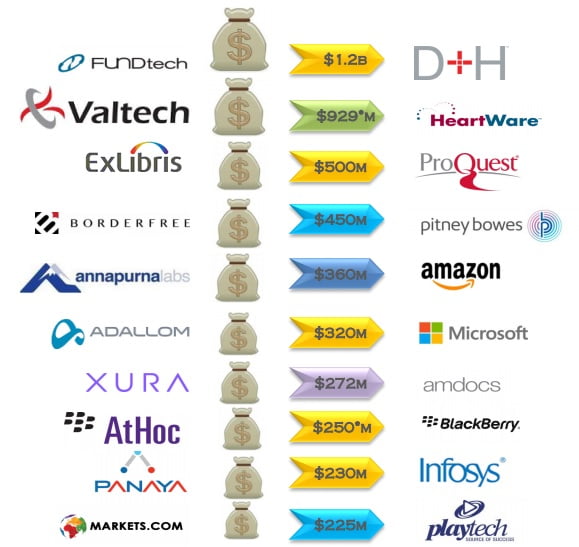Israeli startups were sold for a total of $9.02 billion in 2015, a 16 percent jump from 2014, according to a new report by Israel-based IVC Research Center and law firm Meitar Liquornik Geva Leshem Tal.
Last year saw the third-highest exit sum in the last decade, with 2006 at No.1 and 2012 at No. 2. According to the report, which was presented during an event in Tel Aviv yesterday, 96 Israeli high-tech and startup companies were sold in 2015 (eight more companies went public), in line with the 10-year average.
SEE ALSO: Israeli Startups Sell For $860 Million In First Four Weeks Of 2015
The average exit deal reached $87 million in 2015, up 40 percent from the 10-year average of $62 million, meaning the overall valuation of Israeli startups has significantly increased.
The top three exits of 2015 jointly accounted for 30 percent of the total exit proceeds. The $1.25 billion acquisition of Fundtech by D+H, an international FinTech company, accounted for almost 14 percent of the total exit proceeds in 2015. The acquisition of Valtech by HeartWare followed, with $929 million (not all proceeds from this deal were paid, and now some HeartWare shareholders are trying to cancel the transaction). At No. 3, IVC ranks ExLibris’ acquisition by ProQuest, which accounted for $500 million.
“Companies are acquired for their human resources and technology assets”
The IVC report shows that VC-backed exit deals broke records in 2015, when 52 VC-backed deals raked in a total of $4.98 billion – the highest in 10 years, bypassing even 2013’s $4.04 billion, which included Waze’s $1.2 billion acquisition by Google.
IVC CEO Koby Simana says that “the increase in the size of the average VC-backed exit has a lot to do with the patience and perseverance with which VC funds have been managing their Israeli portfolios lately. The VCs, many of which have been successfully raising new funds in the past two years, have enough breathing room to patiently wait for portfolio companies to realize their full potential.”
SEE ALSO: VCs, Angels, Crowd Funds: Who Rules The Israeli Investment Landscape?
According to Alon Sahar, partner in Meitar Liquornik Geva Leshem Tal, “companies are still being acquired for their human resources and technology assets; however, in more and more cases the companies have a real ability to penetrate markets and establish an impressive business – a fact which is translated into higher valuations.”
Other successful Israeli companies, which did not perform an exit but rather continued to grow both organically and through acquisitions include IronSource, Outbrain, Taboola and Fiverr. “They are creating a significant trend, and their maturing valuation is also representative of Israeli high-tech’s growth,” Sahar says.
Sign up for our free weekly newsletter
SubscribeMeanwhile, IPO exits slowed down in 2015, following an exceptional 2014. Eight Israeli high-tech IPOs accounted for $609 million, a mere 7 percent of the total exit proceeds in 2015, compared to 2014’s outstanding 27 percent. “The number of deals was lower than expected, as many companies shelved their IPO plans due to worldwide IPO market trends – NASDAQ’s in particular – as markets no longer seemed to offer favorable conditions for initial public offerings,” according to IVC.
Cyber-security bubble?
However, raising funds from venture capital firms could also prove challenging, especially in advanced rounds of financing. Eddy Shalev, founding partner of Israeli VC firm Genesis Partners, said at the IVC event yesterday that “it’s an illusion that there’s easy money in Israel. True, a lot of money is available here from angel investors, but at later stages it’s harder to raise money.”
In other words, the move beyond angel money to VC money is not an easy one. Carmel Ventures‘ Daniel Cohen further explains the phenomenon: “Overall, VCs have the same amount of money – the figure is not changing dramatically – but there are so many startup companies that the competition is intense.”
It’s especially intense in the much-hyped cyber-security sector: 500 new cyber-security startups were launched around the world last year, 300 of them in Israel, Sahar said at the event. “There’s certainly an inflation of cyber-security startups in Israel,” Shalev warns. “It’s a bubble; there are too many players in this arena.”
TLV Partners‘ Rona Segev disagrees. “Violence and wars have gone into cyber-sphere and we have no way to protect ourselves,” she says. “The threats are real and enormous, and we’re in need of protection.”
Two reports, different results
It’s important to note that two reports released over the past two weeks show different results: IVC’s shows $8.4 billion in exits (excluding IPOs) , a much higher figure than the one reported recently by accounting firm PwC, which showed a total of $7.2 billion in exit proceeds (excluding IPOs).
Overall, the IVC report is more inclusive and considers more companies to be Israeli: IVC recorded 96 deals (excluding IPOs), whereas PwC’s report recorded only 62 exits. Both IVC and PwC tell NoCamels that the gap can be explained by their different methodologies
Infographics and photos: IVC Research Center, Gilad Avidan
Related posts

Editors’ & Readers’ Choice: 10 Favorite NoCamels Articles

Forward Facing: What Does The Future Hold For Israeli High-Tech?

Impact Innovation: Israeli Startups That Could Shape Our Future







Facebook comments